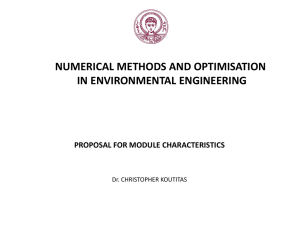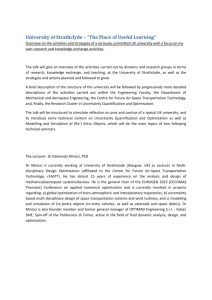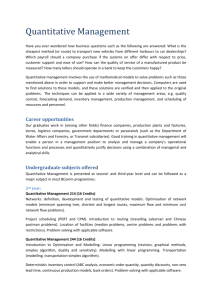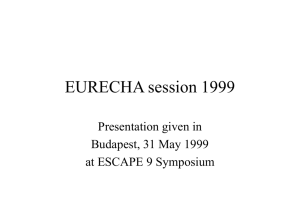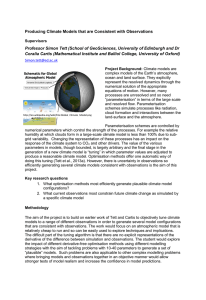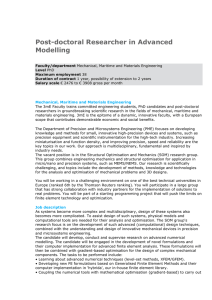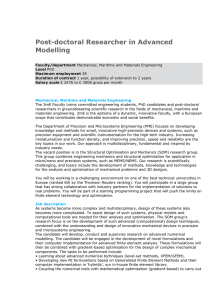eng_Undergraduate_OperationsResearch edited
advertisement
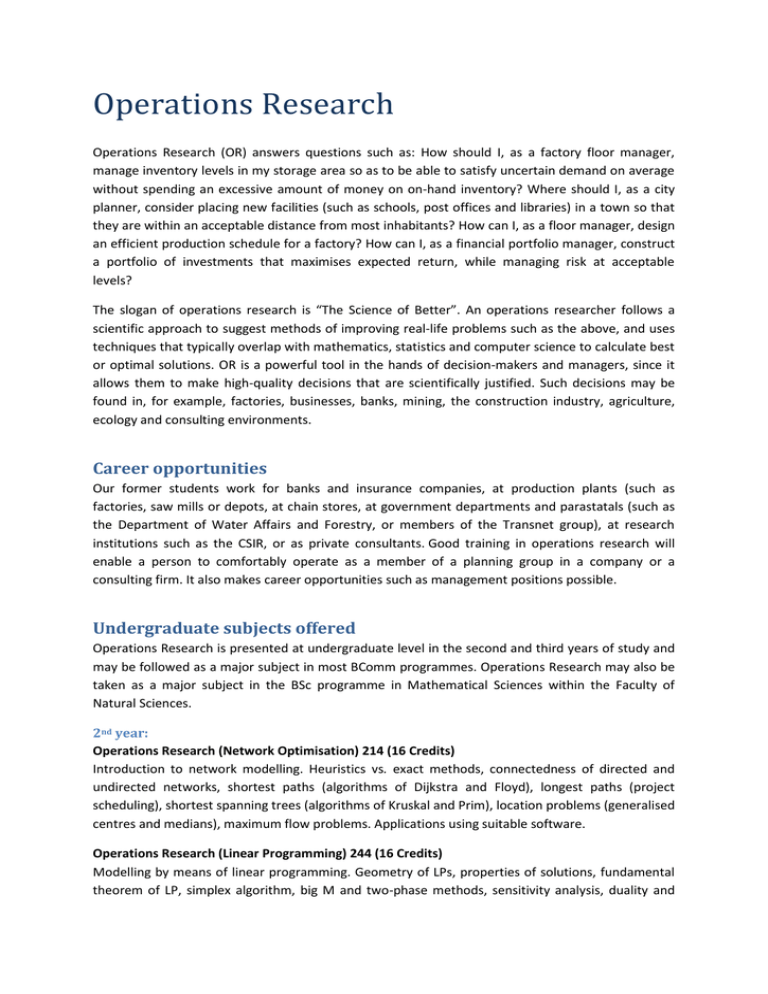
Operations Research Operations Research (OR) answers questions such as: How should I, as a factory floor manager, manage inventory levels in my storage area so as to be able to satisfy uncertain demand on average without spending an excessive amount of money on on-hand inventory? Where should I, as a city planner, consider placing new facilities (such as schools, post offices and libraries) in a town so that they are within an acceptable distance from most inhabitants? How can I, as a floor manager, design an efficient production schedule for a factory? How can I, as a financial portfolio manager, construct a portfolio of investments that maximises expected return, while managing risk at acceptable levels? The slogan of operations research is “The Science of Better”. An operations researcher follows a scientific approach to suggest methods of improving real-life problems such as the above, and uses techniques that typically overlap with mathematics, statistics and computer science to calculate best or optimal solutions. OR is a powerful tool in the hands of decision-makers and managers, since it allows them to make high-quality decisions that are scientifically justified. Such decisions may be found in, for example, factories, businesses, banks, mining, the construction industry, agriculture, ecology and consulting environments. Career opportunities Our former students work for banks and insurance companies, at production plants (such as factories, saw mills or depots, at chain stores, at government departments and parastatals (such as the Department of Water Affairs and Forestry, or members of the Transnet group), at research institutions such as the CSIR, or as private consultants. Good training in operations research will enable a person to comfortably operate as a member of a planning group in a company or a consulting firm. It also makes career opportunities such as management positions possible. Undergraduate subjects offered Operations Research is presented at undergraduate level in the second and third years of study and may be followed as a major subject in most BComm programmes. Operations Research may also be taken as a major subject in the BSc programme in Mathematical Sciences within the Faculty of Natural Sciences. 2nd year: Operations Research (Network Optimisation) 214 (16 Credits) Introduction to network modelling. Heuristics vs. exact methods, connectedness of directed and undirected networks, shortest paths (algorithms of Dijkstra and Floyd), longest paths (project scheduling), shortest spanning trees (algorithms of Kruskal and Prim), location problems (generalised centres and medians), maximum flow problems. Applications using suitable software. Operations Research (Linear Programming) 244 (16 Credits) Modelling by means of linear programming. Geometry of LPs, properties of solutions, fundamental theorem of LP, simplex algorithm, big M and two-phase methods, sensitivity analysis, duality and complementary slackness, special cases of the simplex algorithm (transport, transshipment, assignment and minimum cost flow). Applications using suitable software. 3rd year: Operations Research (Combinatorial Optimisation) 314 (16 Credits) Binary and integer programming (branch-and-bound methods, cut level methods), heuristics (n-Opt procedures). Applications with respect to assignment problems, colouring problems, covering problems and domination problems, Hamiltonian graphs (the travelling salesman problem). Kitbag problems. Applications using suitable software. Operations Research (Decision Analysis) 324 (16 Credits) Problem structuring and modelling, preference modelling (utility theory, ranking, relative importance of criteria), paired comparisons of alternatives, determining weights for criteria, sensitivity and robustness of solutions, the AHP). Forecasting. Inventory control (deterministic and stochastic models). Applications using suitable software. Operations Research (Optimisation) 344 (16 Credits) Introduction to optimisation and functions in Rn, unconstrained optimisation (search methods and gradient methods), constrained optimisation (Lagrange multipliers, quadratic programming, separable optimisation). Goal programming. Applications by means of suitable software. Operations Research (Stochastic Methods of Operations Research) 354 (16 Credits) Queuing theory (modelling of arrival and service processes, birth-death processes, single and multiple server queues, finite population, constant service time, open queue networks, priorities, chi-squared test), Markov-analysis, simulation (random numbers, continuous random variables, Monte Carlo simulation, discrete random event simulation, analysis of output). Applications using suitable software. Please consult the official Economic and Management Sciences Yearbook for more information regarding subject combinations and requirements.

